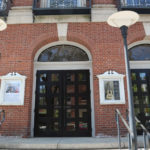
Yale Daily News
On Feb. 22, three School of Music students and one alumna — Udi Perlman MUS ’26, Joel Thompson MUS ’26, Frances Pollock MUS ’25 and Alexis Lamb MUS ’20 — were awarded the prestigious Charles Ives Awards.
The Charles Ives Awards are a set of scholarships and fellowships awarded to young composers. Each year, the American Academy of Arts and Letters awards six $7,500 scholarships and two $15,000 fellowships. The awards are named after Charles Ives, an American modernist composer who graduated from Yale in 1898.
“This prize is meaningful to me because of its namesake,” Perlman said. “[Ives] somehow manages to be totally avant-garde but also nostalgic and sentimental. His music is a beacon of inspiration for me.”
A committee of Academy members — including Yale alumni Robert Beaser ’76 MUS ’86, Julia Wolfe MUS ’86 and George Lewis MUS ’74, as well as professor of composition Martin Bresnick — selected the award’s winners. Four out of six, or two-thirds, of the recipients were Yale-affiliated.
In between their sentiments of gratitude for the award, Pollock and Thompson also reflected on opportunity and privilege in the classical music world.
“When you go to a place like Yale you think a lot about privilege, and you think a lot about opportunity that is afforded to you that other composers have to fight for,” Pollock said.
Pollock explained that there is a tradition of looking to Yale as a place that produces prominent composers due to its reputation in the music world. According to Pollock, being part of a musical network like Yale’s can privilege certain musicians and composers, even though there are many other institutions with “composers who are just as competent.”
Thompson said that the classical music world is grappling with problems of access and opportunity for all musicians.
“These are things we are beginning to and continue to interrogate,” Thompson said. “I don’t want this particular lens that I’m viewing everything through to be taking away from the sense of gratitude that I have for receiving the award. It’s just these things are on my mind all the time, and it’s frankly what my music is about.”
For his application, Thompson submitted a choral piece titled “The Seven Last Words of the Unarmed” and a string quartet titled “In Response to the Madness.” Both pieces respond to problems in American society: “The Seven Last Words of the Unarmed” to police brutality and “In Response to the Madness” to general socio-political tensions in the United States.
“It was essentially a scream into the void,” Thompson said. “The method that I used to write the piece [“In Response to the Madness”] was reading the news before I sat down to compose, and then trying to directly translate my emotional response into the music itself.”
Pollock’s submitted works also came from a personal place, drawing inspiration from her own relationships. Her mixed ensemble piece, “Pillow Talk and Promises I Promise to Keep,” was written for her wife on the day after their wedding.
Perlman likened his composition to a kaleidoscope, with “constantly changing patterns and colorful sonorities.”
“The idea of a kaleidoscope, a toy that turns cheap pieces of glass into beautiful shapes, is an accurate description of the way I approach composition,” Perlman said. “A common thread through many of my works is a fascination with small, seemingly trivial musical ideas and the attempt to find some kind of hidden or broken beauty within them.”
The Charles Ives Awards were first established in 1970 after Ives’ widow made a donation to the Academy to fund composition scholarships.
Marisol Carty | marisol.carty@yale.edu









